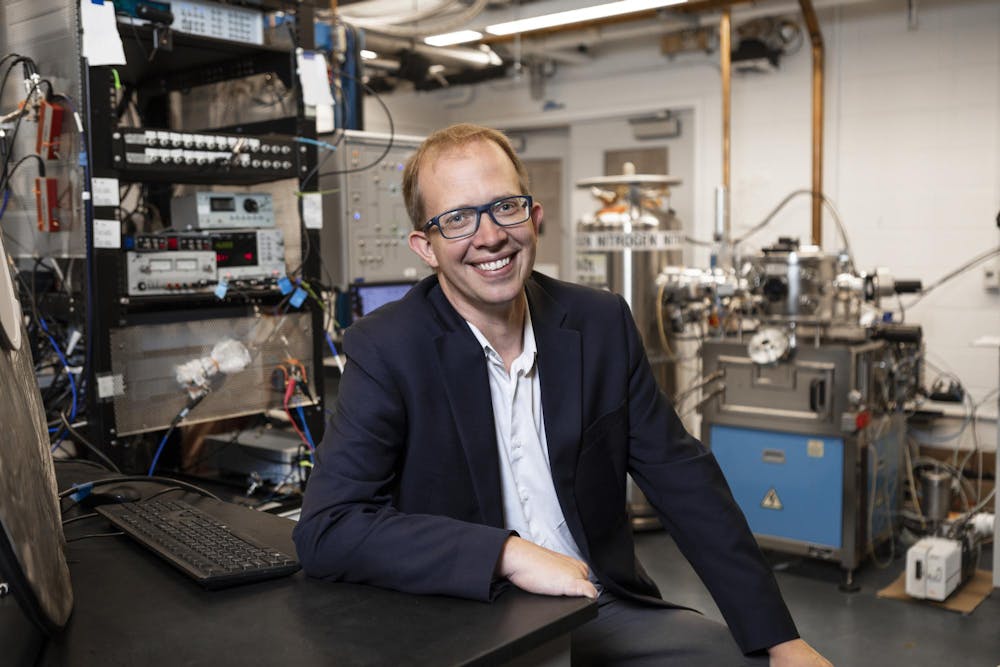Andrew Houck ’00 has wanted to be in academia since he graduated as Princeton’s valedictorian 25 years ago. Now, he will have the chance to lead an entire school as the new Dean of the School of Engineering and Applied Science.
Houck takes over for Andrea Goldsmith, who is leaving the university at the end of month to become the president of Stony Brook University, at a tumultuous time for the engineering school, and Princeton as a whole. Entire departments and burgeoning research institutes are on the cusp of moving to a new building complex nearing completion, while grappling with a uniquely rocky moment for federal research funding.
In an interview with The Daily Princetonian, Houck expressed his hope to begin restoring the cooperation between universities and the federal government, describing the current relationship as “strained.”
“The government has funded science and engineering in ways that have paid off, both academically, economically, and for security reasons since the Second World War,” he said. “We need to try to preserve the core of that relationship at the same time, while preserving our University’s values.”
“That means really trying to find the common ground and the ways that we can continue to work together and strengthen that relationship, because it’s so essential, both to what we do as a university and to what the country does,” he added.
Houck is a professor of electrical and computer engineering and directs the Princeton Quantum Initiative, one of the University’s investments in engineering research in the last decade. He is also the director of a quantum research center run by the Department of Energy.
While a student at Princeton, Houck studied electrical engineering and was a residential college advisor in Wilson College and a member of the Princeton Evangelical Fellowship. In his graduation bio, he said he wanted to pursue a career in teaching and research at a university.
In his valedictory address, he spoke at length about trees on Princeton’s campus, and touched on the Orange Bubble’s relationship to the outside world. “Although at times we shelter ourselves from the world around us, the Princeton name is not a shield. Princeton’s campus, and its students, must celebrate and suffer with everyone else,” he said.

Houck will step into his new position in the fall, entering the role as the University and higher education continue a rocky relationship with the federal government. This past year, funding for research grants was suspended for Princeton along with many other institutions, as the Trump administration threatens increased taxes on the endowment and other contentious measures aimed at elite universities.
“Andrew understands the soul of the School, and he has the exceptional vision and skills required to lead it forward at a time of both turbulence and opportunity,” University President Christopher Eisgruber ’83 said in the announcement of Houck’s appointment.
Another key relationship that Houck aims to repair is that between longstanding scientific institutions and the public. He says a clearer dialogue around what science proves, what scientists recommend, and scientific opinion will aid this restoration of trust.
“I think if you keep those three categories separately when you speak, then you’ll have a little bit of humility when you engage with the public,” he said. “I think sometimes when we’ve gotten ourselves in trouble, is when we start to conflate what’s a true science of fact, what’s a well-grounded recommendation and what’s a sort of unrelated opinion.”

“Once you start to lose a bit of public trust, then that opens the door for anybody to fill in that gap with things that aren’t grounded in the sort of scientific findings,” Houck continued.
Houck also addressed his intentions to maintain diversity and inclusivity in engineering, describing the phrase DEI as a “boogeyman” in today’s society. “If everybody has had the same training and comes through the same programs and thinks the same way, then often, the first solutions that come to mind are almost always the same,” he said.
“People can often get lost in a fight over the words and lose sight of the fact that there are core principles here that matter.”
Devon Rudolph is an associate News editor and staff Sports writer for the ‘Prince.’ She is from northern Virginia and typically covers student life and USG.
Please send any corrections to corrections[at]dailyprincetonian.com.
Correction: A previous version of this article referred to the name of the School of Engineering and Applied Science as “Sciences” instead of “Science.” The ‘Prince’ regrets this error.








